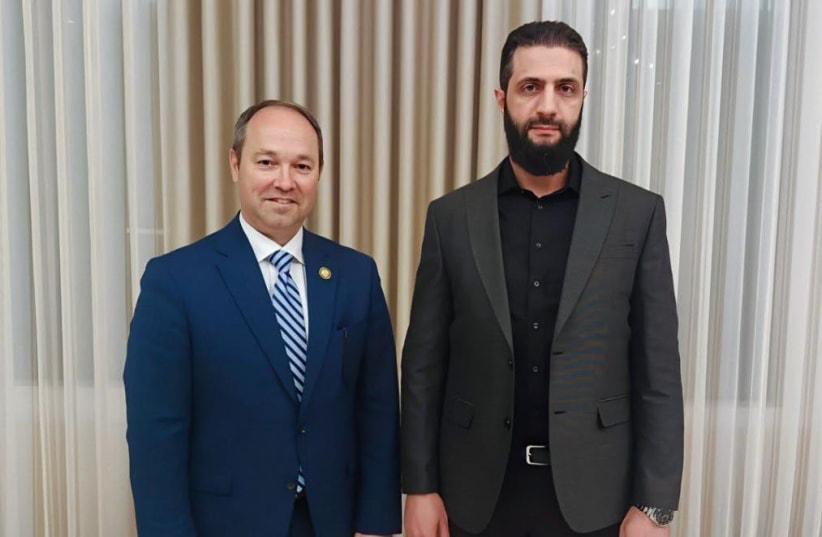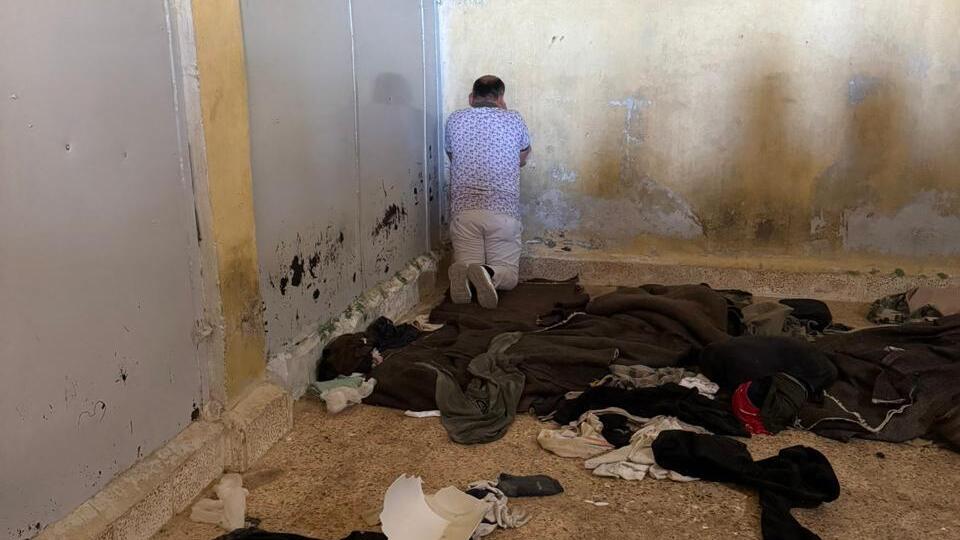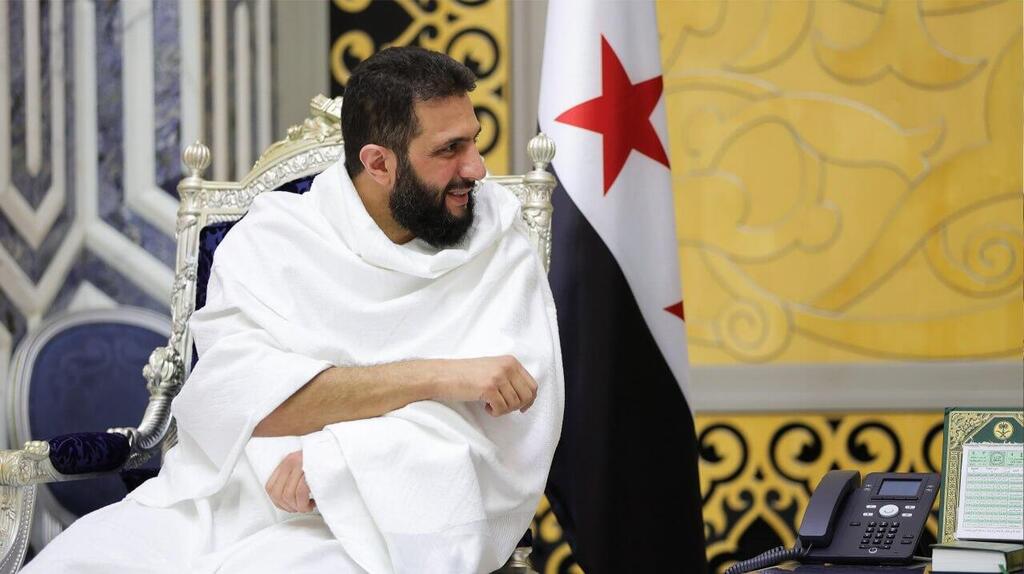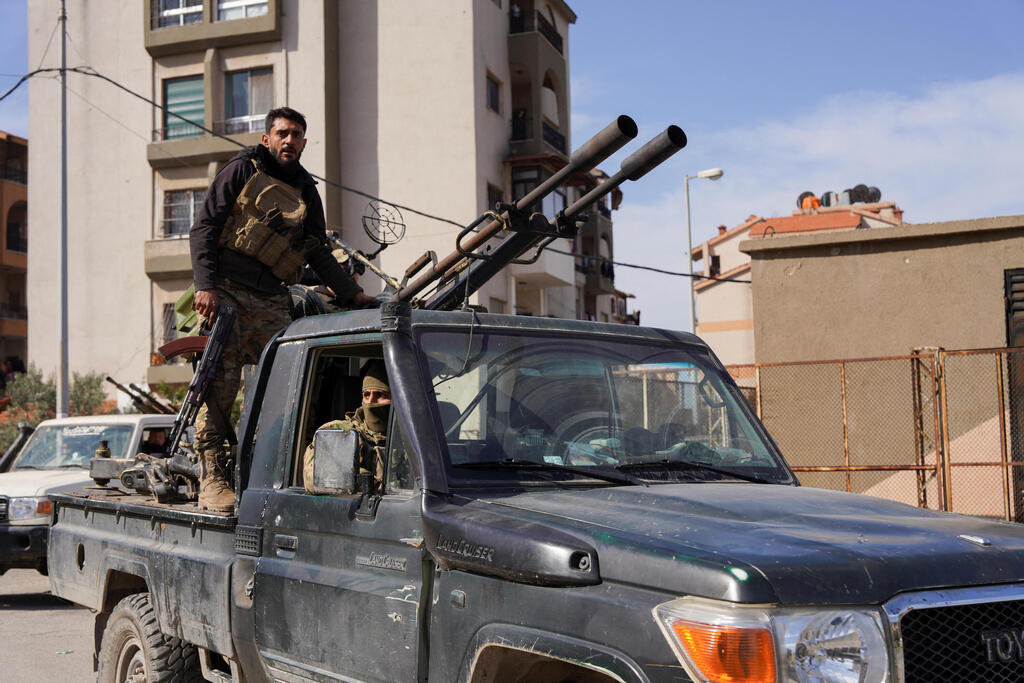Two days have passed since U.S. Representative Marlin Stutzman returned to his home in Indiana. The jet lag, he says, is nearly behind him — "My body doesn't know what was going on," he laughs — but his mind is still in Damascus.
Speaking to Ynet in an interview, he described his historic visit to Syria following the fall of the Assad regime as a "dream come true for me."
"Growing up hearing stories of Damascus, Damascus Road conversion and the history of Damascus in Syria, it's one of those places you'd always like to visit, along with Israel and other parts of the Middle East," he said. "We always talk about peace in the Middle East, and this is one of those moments where there's potential and a possibility now that Assad's gone."
The visit, he says, was born from a personal connection. "I've got some really good Syrian friends that live in Chicago and Indiana, and we've been friends for over a decade now," Stutzman explains. "They had come to me several times asking me to support lifting the sanctions on Syria now that Assad is gone. I just told him it's hard for me to do that, not knowing all of the circumstances and what's on the ground."
That is how he found himself, along with fellow Republican Congressman Cory Mills, on a 48-hour journey into the heart of Damascus, accompanied by the Syrian-American group Alliance for Peace and Prosperity. "We had good security. I did not feel like there was any danger," he says. "The Syrian people are still resilient. They would look you in the eye, they would return a smile. They are hopeful and optimistic that this is a new day in Syria."
Stutzman, 48, speaks with emotion about his impressions from the trip, the conversations he held with Syria’s new president Ahmad al-Sharaa and the real possibility of new relations between Damascus and Jerusalem.
Despite his clear optimism, Stutzman does not shy away from describing the harsh sights he encountered. "The thing that amazed me was the destruction everywhere," he says. "Assad just basically levels billions and billions of dollars of homes and businesses, and little children's rooms, you could see from the street where they had Minnie Mouse and Superman on the wall, and you just know that families were killed or pushed out of their homes because of a maniac. That was a political genocide on his own people.
Another experience that shook him was a visit to one of Syria’s largest prisons. "We had a former prisoner give us a tour of the prison, and it'd be atrocities that happened there are just beyond words."
Although Stutzman did not see signs of the "openness to the West" many in the region had hoped for, he said he was surprised by the displays of "love for America" he encountered. "They're far from Western culture," he said. "Gas stations aren't working, young men sell gasoline and jugs on the side of the road, the power goes out every four hours and their infrastructure is old. The roads aren't too bad in most cases.
According to Stutzman, many Syrians expressed admiration for America and President Donald Trump, crediting him with saving thousands of lives by deciding not to bomb Syria’s Idlib Province in 2018 — a move they believe allowed the process that ultimately toppled Bashar Assad to unfold.
The centerpiece of the visit was a meeting with Syria’s new president, al-Sharaa. "We met him at the presidential palace in Damascus," Stutzman said. "Even though the pressure on him was visible, he was very calm and very deliberate. You could feel his desire to build something different for the country."
During their conversation, Stutzman took the opportunity to raise the subject of Israel. "I brought up the issue, and there was no anger, there was no bad emotion directed toward Israel," he said. "I told him the relationship with Israel for the American people is very important, and asked him what he envisioned the relationship between Syria and Israel, and he was very honest."
According to Stutzman, not only did al-Sharaa not evade the question, but he also spoke about a vision in which one day tourists would travel from Jerusalem to Damascus. "He said that he was open to the conversations around the Abraham Accords," Stutzman said.
"He seemed like someone who wants to turn Syria into a different place, one more open to trade, tourism, agriculture and energy. He was excited about developing trade routes from north to south and to Europe. If Syria were to join the Abraham Accords, it could change the entire Middle East."
However, al-Sharaa emphasized two preconditions to the visiting U.S. lawmakers: Syria must not be divided into two or three parts, and Israeli airstrikes — especially near the Golan Heights — must stop.
Did he propose any concrete ideas for a solution, such as accepting a peacekeeping force on the Golan?
"We didn’t go into concrete details," Stutzman said. "He only said that negotiations must take place to find solutions that guarantee Syria’s unity."
However, reactions in Israel to Stutzman’s visit have been skeptical — a sentiment he acknowledges. "Israeli officials are not really buying this. They say, 'a terrorist is a terrorist, doesn't matter if he puts on a suit,'" he said. "It's possible, and shame on him if he is. There's an opportunity here and I would hope that al-Sharaa has changed. At one time, Japan and Germany were enemies of the United States. We know the devil that we had in Assad, and if al-Sharaa is a smart enough guy, he would learn the lessons that the same consequences could befall him. That's why I think it's important to have a dialogue with him, because we don't want to just push him back into the arms of Iran, China or Russia."
Stutzman is also clear-eyed about the motivations behind al-Sharaa’s willingness to meet. "He didn’t ask for a single dollar from the United States," Stutzman emphasized. "He only asked for the sanctions to be lifted, which he said are preventing Syria’s recovery. According to him, the rebuilding process will require hundreds of billions of dollars. Without lifting sanctions, there is no real chance for reconstruction."
However, Stutzman said he made it clear that lifting sanctions would come with strict conditions: "Respect for human rights, women's rights, religious rights — and maintaining safe relations with Israel while ensuring Syria does not become a base for terrorism or a satellite for America’s enemies."
Stutzman pointed to some encouraging signs. "The minister of communications and technology is living in the UAE right now. And he had no idea that he would become a minister back in his home country, but they said President al-Sharaa kept pursuing him, wanting him to be a part of his government," he said. "These ministers are taking a chance on him as well. It's not like al-Sharaa is coming in with a strong military and a strong government to take over the country of Syria. He's got a lot of rebuilding to do."
Get the Ynetnews app on your smartphone: Google Play: https://bit.ly/4eJ37pE | Apple App Store: https://bit.ly/3ZL7iNv
One critical issue for Stutzman was the need for free elections. "If they don’t hold democratic elections, it will just turn into another dictatorship and collapse on itself," he said. "I asked him directly: Why wait five years for elections?"
Al-Sharaa, he said, responded that many people had fled Syria and that holding elections in a half-empty country would not be genuine. He said time was needed for citizens to return and rebuild before organizing free elections.
Stutzman found this explanation reasonable but stressed he would remain vigilant. "I told him — this will be the real test. If in five years you haven’t held elections, that will be the true indicator of who you are and whether this was all just a show."
Stutzman emphasized that his trip was not an official mission on behalf of President Trump. "I traveled on my own initiative," he clarified. However, he added, "The White House is aware of the visit, and there is significant interest. Trump is the strongest negotiator we’ve ever had — if anyone can talk directly with al-Sharaa, it’s him."
According to Stutzman, the Syrians themselves are seeking that connection. "Al-Sharaa said he received outreach from Russia and China but refused to respond. He wants to talk to America. He is seeking dialogue with the West. They are currently dependent on Chinese communication technology and fear China is listening to them. That’s another reason they want a connection with the West."
"I know how hard it is to trust a former enemy," Stutzman said. "But if there’s even the slightest chance to change reality, it’s worth trying — not with blind eyes, but also not with a closed heart. The sanctions are keeping Syria frozen in place," he concluded. "If there is real willingness for dialogue, for relations with Israel, for true freedom — we must not miss this opportunity. We need a ‘trust but verify’ approach: watch, listen, and judge each day by actions. If he fails, we will know. But if he succeeds — it could be a historic opportunity that may never return."









